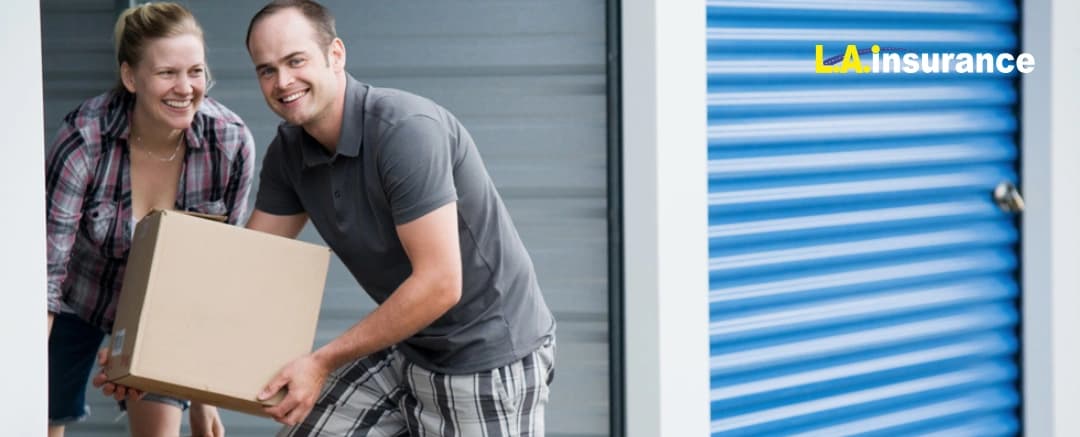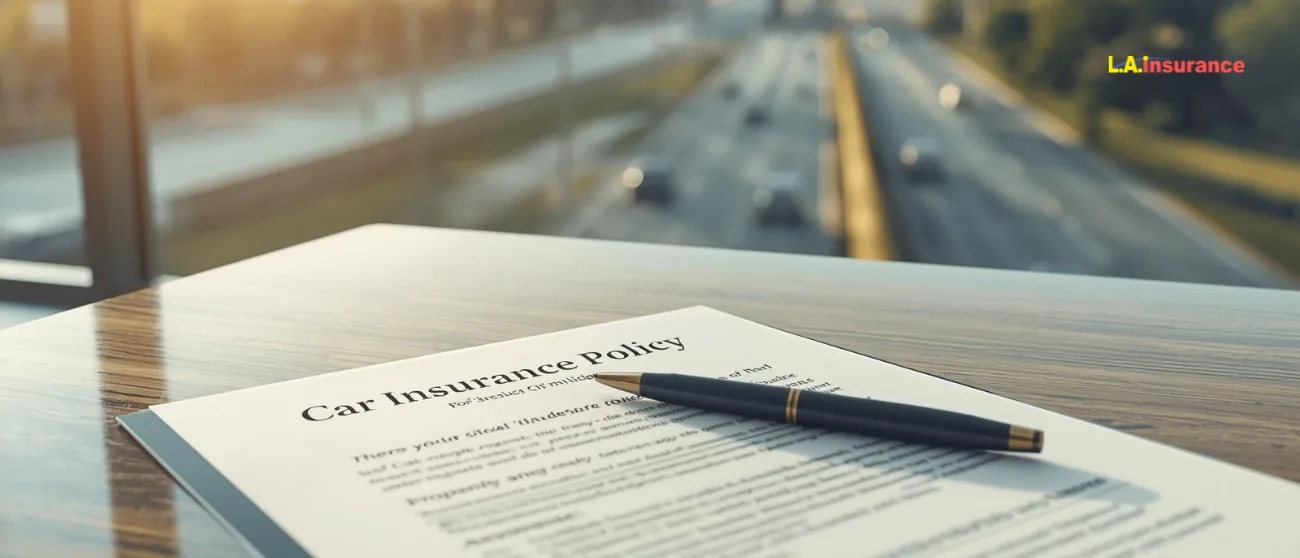
Publish Date: 11-08-2025
Renter's insurance
Last Updated: 15-12-2025
Does Renters Insurance Cover Storage Units?
Yes, renters insurance does cover storage units, but with limits. Most insurance policies cover personal property in a storage unit up to 10% of your total personal property coverage. Protection usually includes theft, vandalism, and certain covered perils, but excludes things like flood, water damage, and pest-related loss.
In this article, we’ll cover what renters insurance covers in a storage unit and how much coverage you’ll get. We’ll also break down coverage limits, options for additional coverage, how to file a claim, and whether your homeowner insurance helps too. Let’s start answering!
What Does Renters Insurance Cover in a Storage Unit?
When you rent a storage unit, your belongings don’t lose protection; just know that protection has some limits. A standard renters insurance cover includes personal property in a storage unit, but only against specific risks known as covered perils.
Let’s look at what these perils are and how they work.
Most renters insurance companies protect stored items against events like:
- Fire or lightning
- Theft and vandalism
- Windstorm hail, or explosion
- Smoke damage
- Damage or destroy caused vehicles (not your own)
- Damage by aircraft
- Falling objects or the weight of ice and snow
- Leaks or water discharge from appliances (not floods or sewer backups)
If any of these situations damage or destroy your items in a storage unit, you may be able to file a claim and receive payment minus your deductible.
And if you need affordable renters insurance to cover your storage unit, please contact the L.A. Insurance agency. We’re known as the most affordable insurance agency nationwide. Whether you’re in Michigan, Texas, Colorado, Florida, or Georgia, we ensure reliable coverage with full flexibility and seamless claim processes. Contact us now or call us at (800) 893-9393 for any queries or get your renters insurance quote online instantly.
But What Does Renters Insurance Not Cover in a Storage Unit?
Renters insurance doesn’t cover everything when it comes to protecting storage units. There are limits, and they matter. Many policies don’t cover the following:
- Flood or surface water damage
- Damage from pests (think rodents or insects)
- Mold, mildew, or gradual deterioration
- Items kept in long-term disrepair
- High-value items like jewelry, coins, or firearms, unless specially added
This is where insurance coverage gets complicated. Just because an item is in storage doesn’t mean it’s fully protected under your renters policy. Certain categories, like electronics or collectibles, often have sub-limits. That means your coverage may cap at a set amount, even for covered losses.
How Much Coverage Does Renters Insurance Offer for Items in a Storage Unit?
Your renters insurance coverage doesn’t stop at your front door. It follows your belongings into a storage unit. However, it comes with limits.
Most insurance policies offer off-premises protection for personal property in a storage unit, but only up to a small portion of your total personal property coverage.
Sub-Limits Vary Based on Where You Live
Typically, insurance companies cover up to 10% of your personal property coverage for off-site items. That means if your policy includes $30,000 in coverage for belongings at home, you’re likely limited to $3,000 for the items in a storage unit.
However, depending on your state, insurance company, and specific policy terms, the actual number can vary. Some states or providers set a flat dollar amount, like $1,000, instead of using a percentage.
For instance, if you’re in Michigan with $40,000 insurance policy, your storage facility belongings might be covered for $4,000, unless the company caps it at a flat rate. If it’s capped at $1,000, that’s all you’d get, even if your items are worth more.
Also, certain categories may have tighter sub-limits. See the following table for example:
Item Category | Sub-Limit |
Jewelry | $1,500 |
Firearms | $2,500 |
Electronics | $1,000 - $2,500 |
Business Property | $500 (off-site) |
How Do I Increase My Coverage Limit?
If 10% is not enough for your stored items, you have other options. The following options allow you to boost your coverage limits and truly cover your personal belongings:
- Scheduled Property Endorsement: List valuable items separately, such as a vintage guitar, jewelry, artwork, antiques, or an engagement ring, and get insurance for each. This way, you have full protection for these items, even if they are in a storage unit.
- Replacement Cost Rider: If you have it, you get full replacement costs. Without it, you only receive the depreciated value, known as the actual cash value. This means that for the $1,200 TV you bought two years ago, you would get the full amount to replace it, not just $500 after depreciation.
- Purchase Additional Insurance for Storage Units: Some insurance companies or the storage facility itself offer added plans that go beyond your renters policy. These can cover your stored property in full, not just 10%.
Here’s an example of how to get full reimbursement for an item in a storage unit that was damaged by a covered event:
Imagine you have $25,000 in personal property coverage, but only $2,500 of that coverage applies to items outside your home. If your storage unit holds $10,000 worth of furniture and collectibles, you can:
- You could add a scheduled property endorsement for collectibles
- Get a replacement cost rider to avoid depreciation
- Buy property insurance from the storage facility to fill the gap
Does My Storage Company Offer Any Protection?
In many cases, yes, storage facilities do offer insurance plans to protect your stored belongings. But here’s the thing: this protection is not always included. It may be optional, or sometimes even required by contract, when renting a unit.
Many storage companies offer their own version of insurance for storage units, often provided through a third-party insurance company. These plans are designed to cover your personal belongings against loss from events like theft, fire, or vandalism.
Some may even offer coverage during transit, which your renters policy may not.
Let’s say your storage facility partners with another insurance company, and they may give you up to $15,000 in protection for a flat monthly cost usually between $6 to $25, depending on the limit.
However, there are still a few things to consider before signing:
- What does it cover? Is it limited to theft, or does it include water damage, hail, or accidents during loading?
- What are the exclusions? Many storage insurance policies don’t cover high-value items like jewelry or documents.
- Do you need both? If your renters insurance coverage already applies to your storage unit, their policy might be a duplicate or might fill a gap.
Does Homeowners Insurance Cover Storage Units?
Yes, if you own a home and have homeowners insurance, chances are your stored belongings are protected too. Like renters insurance, a homeowners insurance cover includes off-premises protection for personal property in a storage unit.
But there’s a familiar limit: most insurance policies will cap this coverage at 10% of your total personal property coverage or a flat amount like $1,000.
Example: If your home insurance covers $60,000 in personal property, you’ll likely have $6,000 of protection for items in a storage unit. Also, keep in mind that certain valuables may still fall under their own sub-limits:
- Guns, jewelry, or artwork may only be covered up to a few thousand dollars
- Electronics may have specific caps too
- Flood or earthquake damage is usually not included
What makes homeowners coverage a bit more flexible is this: If your house is under repair from a covered peril, and you temporarily move belongings into storage, some insurance companies will waive the off-premises limit. In this case, you could get full protection for your stored items.
Pro Tip: Always check the fine print of your insurance policy. And call your insurance company if you’re unsure about what’s covered, how much, and when.
Filing a Claim for Property Loss in a Storage Unit
If your stored belongings are damaged or destroyed, you can file a claim through your renters insurance personal property coverage. But whether you get compensated and how much depends on a few things.
First, the loss must be caused by a covered peril such as theft, fire, or vandalism. If it’s due to something like a flood, pests, or poor maintenance, your insurance company may deny your claim.
Second, your claim must align with your policy’s coverage limits. Keep in mind that items in a storage unit are usually covered up to 10% of your personal property or a flat amount like $1,000 unless you purchase a scheduled property endorsement and replacement cost rider.
Here's how to start the claim process:
- Notify your insurer immediately. You can call them or go online to report the loss.
- File a police report if needed. For theft or vandalism, insurance may require proof.
- Gather all documentation such as receipts, photos, and product serial numbers.
- Work with the adjuster. They’ll inspect the loss, ask questions, and decide payout.
In case of documentation, you should document your property items while you're purchasing the insurance. In this way, it would be easier for you to file a claim. If you don’t have a clue how to document the items in a storage unit, follow the next section.
Documenting Your Belongings in a Storage Unit
If you have to file a claim, taking photos and videos of the items and creating a home inventory can help you make your claim process faster and hassle-free.
Many people underestimate how important it is to keep detailed records of what they store. But if you want your insurance coverage to work for you, try to make a proper list of items with their replacement price.
Here's what you need to do:
- Make a full inventory of what you’re storing.
- Take photos or videos of each item.
- Save receipts, warranty cards, or purchase details.
- For tech or electronics, note serial numbers and dates of purchase.
- Keep backups of these records digitally, on Google Drive, Dropbox, or a secure email folder.
Should I Purchase Storage Unit Insurance?
Yes, you should purchase storage unit insurance if your stored items are worth more than your policy covers.
Your renter's insurance usually extends to your storage unit, but only up to 10% of your personal property coverage. That’s often $1,000 to $5,000 of coverage, and that limit shrinks even more with sub-limits for items like electronics, jewelry, or business property.
If your stuff is worth more than that, or includes high-value items, then purchasing additional insurance for storage units could be the right move.
In addition, some storage facilities require you to carry insurance as part of your rental contract. If you don’t have a valid insurance policy, they may ask you to buy theirs on the spot, usually from a third-party insurance company.
Here’s when getting extra insurance makes sense:
- You’re storing more than $5,000 worth of stuff
- You don’t want to risk denial because of fine print coverage limits
- You want protection from gaps in your homeowners or renters policy
- You’re worried about perils not covered, like flood, mold, or rodents
Storage Unit Packing Tips
Packing your storage unit the right way not only save space but also protects your stuff. In fact, some sort of damage can be prevented with just smart packaging.
Here are some of the tips:
- Know what you’re storing and what you shouldn’t. Don't store valuable items like cash, jewelry, or important documents. Most insurance policies won't cover these if they get lost.
- Create an inventory. Before you even lock the door, make a full list of what’s inside. This helps with organization, and it’s a lifesaver when you need to file a claim.
- Choose the right unit. Not all storage facilities are the same. For electronics, artwork, or wood furniture, a climate-controlled unit helps prevent water damage, mold, or warping.
- Raise fragile items. Use pallets or shelving to keep boxes off the floor. This protects your items in case of minor leaks or humidity.
- Wrap fragile items well. Use bubble wrap, packing paper, or cloth. Avoid newspapers, as they can stain. Don’t stack heavy boxes on top of breakables.
- Disassemble bulky items. Break down tables, bed frames, or shelving units. This makes storage more efficient and prevents accidental breakage.
- Label everything. Clear labelling helps you find things faster and proves what’s inside in case of a claim. Use waterproof markers and keep a copy of your map or list.
Related Readings:
Frequently Asked Questions (FAQs)
What things does renters insurance not cover?
Renters insurance doesn’t cover everything. Most policies exclude flood and earthquake damage, loss from pests (rodents, insects, mold), business property beyond set sub-limits, high-value items (unless scheduled separately), and normal wear and tear or neglect.
What type of insurance is needed for a storage unit?
You can use either renters insurance or storage unit insurance. If your renter’s policy includes off-premises coverage, it typically protects personal property in a storage unit up to 10% of your coverage limit.
Is a storage unit considered rent?
No, a storage unit is not considered rent in the same way your apartment or home lease is. However, it may be part of a legal contract with a storage provider. That’s why some facilities require proof of insurance before renting a unit. Your renters insurance will still apply to your stored items, but the storage cost itself isn’t covered or treated as rent.
Does insurance pay for storage?
Insurance doesn’t pay your storage fees. But it can pay for damaged or stolen items inside the unit if the loss was caused by a covered peril. In some cases, like after a fire or home loss, your insurer may cover temporary storage under loss of use. But that’s different from regular storage rent.
Editorial Disclaimer
The information provided on this blog is for general informational purposes only and does not constitute professional insurance, legal, or financial advice. Coverage and rates are subject to individual eligibility, underwriting guidelines, and state availability. For specific questions regarding your policy or to get an accurate quote, please contact a licensed L.A. Insurance agent directly. We're an independent agency and not a direct insurance carrier. For more information on how we operate and handle your data, please see our Terms and Conditions and Privacy Policy.
Tag :
Renter's insurance








